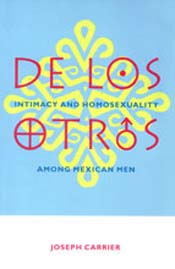 |
|
Among Mexican Men International Gay & Lesbian Archives, ONE Institute Press De Los Otros: Intimacy and Homosexuality Among Mexican Men by Joseph Carrier, Columbia University Press, 1995, 230 pages, paperback ISBN 0-231-09693-3 Abstract
 De los Otros: Intimacy and Homosexuality Among Mexican Men discusses lower-middle-class and upper-working-class male homosexual behavior and identity in Mexico, as well as strategies used by men who have homosexual experiences or a homosexual identity to navigate their way through varying degrees of social disapproval and to carve out the space necessary to express themselves intimately with other men.
De los Otros: Intimacy and Homosexuality Among Mexican Men discusses lower-middle-class and upper-working-class male homosexual behavior and identity in Mexico, as well as strategies used by men who have homosexual experiences or a homosexual identity to navigate their way through varying degrees of social disapproval and to carve out the space necessary to express themselves intimately with other men.
The ethnographic research presented by Carrier was collected over a twenty five year period starting in 1969, with a large portion of the research focusing on Guadalajara, Mexico's second largest city. The book is divided into two sections, the first describing male homosexual behavior and identity and the second offering four case studies which help to draw connection between theory and actual lived experience, enabling the reader to more fully integrate and understand the ideas presented in the first section. Review Mexican society is a patriarchal system that valorizes masculinity and devalues femininity, especially when perceived in men. Boys and men are expected to behave in a manner consistent with cultural expectations of masculinity, or be subject to social disapproval and sanctions: As a consequence of the high status given manliness, Mexican males from birth onward are expected to behave in as manly a way as possible. Penalosa sums it up as follows: 'Any signs of feminization are severely repressed in the boy.' McGinn conclude: "The young Mexican boy may be severely scolded for engaging in feminine activities, such as playing with dolls or jacks. Parents verbally and physically punish 'feminine' traits in their male children'. (p.4) Mexican males are encouraged to engage in role playing compatible with dominant cultural values of masculinity, including dominance, aggression and independence.
Pasivo males are the opposite of activos in that they are submissive during anal or oral sex. Pasivos are stigmatized for their sexual behavior and role, which is consistent with the appropriate female role. Pasivos are often times viewed as somehow less then male, not equal to other men in society. Activo males generally exhibit other "masculine" characteristics, while pasivos often exhibit "feminine" characteristics (gestures, speech, dress/style). Mexican society views activos as "normal" heterosexual men, even though their partners may include other men, while pasivos are considered transgressive and homosexuals. It is important to note that homosexual and afeminado are synonymous with the more often used colloquial terms puto, joto, maricon (see example, Jiminez 1971, 199). Since all these terms apply only to those males who play the anal-receptive sex role in a homosexual encounter, the implication is that the anal-insertive masculine male is not homosexual - and separate terms exist to describe him (mayate, chichifo, and picador). Thus from an early age Mexican males are likely to be aware of same-sex contacts and of the activo -pasivo dichotomy that exists between males have sexual contact, and that there is a stigma associated with the pasivo but not the activo sex role. (p.17) If sexual dominance is maintained during intercourse, masculinized activos retain their gender / sexual privilege, presumably enjoying the sex as well as freedom from social condemnation, while the femininzed pasivos are subject to ridicule, a general sense of social disapproval. "As a result of the negative sanctioning of effeminate behavior from childhood on, Mexican males predictably hold effeminate males in low esteem throughout their lives. They are always the butt of jokes, teased, and harassed" (p. 18). In recent years a new category, internacional, has emerged to identify those who have sex with men, playing either the activo or pasivo roles. This category contradicts popular notions surrounding homosexuality in Mexico which identify pasivos as homosexuals, that is as feminine and penetrable and which identifies activos as "normal" men who are masculine and who penetrate others (regardless of gender of those penetrated). However, as US / Western ideas regarding gay liberation has influenced Mexican ideas of sexual identity and behavior, Mexican homosexual males (who identify as or who are involved to a large extent with a gay community) have begun resisting the activo / pasivo binary, exploring and expanding their repertoire of sexual behavior and identity.
Most men who participate in homosexual relations try to hide their activity from family members. Both feminine pasivos and masculine activos show their concern with protecting their reputation and the reputation of their families by trying to portray themselves in as masculine way as possible, thus excluding or at least lessening through secrecy, the likelihood of knowledge of their homosexual relations. The principle tactic, common both to the family and society, is to keep effeminate behavior out of sight as much as possible. An effeminate male tries as best he can, especially in family gatherings, to behave in a masculine way. If he has sexual contacts with males rather than females, he does it discreetly. (p.18) Pasivos are much more likely to be identified and labeled homosexual according to their feminine behavior while activos generally will be identified as heterosexual according their masculine demeanor. Thus pasivos and activos generally deal with different sets of problems associated with family and society in regards to their sexual behavior or identity. Pasivo or effeminite men, due to society's concern with their masculinity, generally have a more difficult time hiding their sexual behavior and identity than do their activo counterparts. Families of pasivos may be forced to come to terms with, tolerate or ignore their son's transgressive gender/sexual behavior or identity, while families of activos may be completely unaware of their sons' sexual behavior or identity. "The relationship homosexually active Mexican males have with their parents and siblings depends on such variables as age, degree of masculinity, extent of involvement in homosexual encounters, and the family's knowledge about homosexual behaviors" (p.58). De Los Otros: Intimacy and Homosexuality Among Mexican Men is a well-written, accessible text which discusses the coping strategies, lifestyles, and sexual behaviors of Mexican men actively involved in same-sex sex. Carrier identifies important distinctions between Mexican male (homo)sexuality and dominant western notions of homosexuality, emphasizing the social construction of sexual behavior and identity. A thorough inquiry into the activo / pasivo dichotomy as well as the relatively new category, internacional, enables the reader to understand how Mexican male homosexuality is conceptualized and played out. Carrier also emphasizes the fluid boundaries of the various sexual roles described to illustrate how these sexual roles and labels do not adequately capture the complexities of male same-sex-sex in Mexico. Carrier also does an excellent job of discussing the centrality of the Mexican family when discussing homosexual behavior, and coping strategies which is then applied to the discussion of the categories activo/pasivo/internacional, drawing attention to the different ways that family facilitate or hinder the expression of same-sex intimacy for each category, which in turn affects the behavior and coping strategies of Mexican male homosexuals. Joseph Carrier is an applied anthropologist. A respected authority in the cultural study of male homosexuality, Carrier received his Ph.D. in Social Science from the University of California, Irvine, and has written numerous articles for professional journals. He contributed chapters to Gilbert herd's collection Gay Culture in America and to Judd Marmor's compendium, Homosexual Behavior: A Modern Reappraisal. James Thing is graduate student of Sociology at the University of Southern California. |


 [One] ůstereotype of Mexican male homosexual behavior rejected by many gay-identified men is that the subpopulation of men who have sex with men can be easily divided into activos and pasivos. They believe this to be untrue and have thus created their own label for those men with no clear homosexual role preference: internacional, 'imputing both variety and foreignness (Taylor 1978b, 112)" (p.193).
[One] ůstereotype of Mexican male homosexual behavior rejected by many gay-identified men is that the subpopulation of men who have sex with men can be easily divided into activos and pasivos. They believe this to be untrue and have thus created their own label for those men with no clear homosexual role preference: internacional, 'imputing both variety and foreignness (Taylor 1978b, 112)" (p.193).